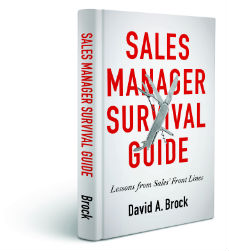
Dave Brock on the Most Overlooked Opportunity in Sales Performance
The sales profession is in trouble. The latest CSO Insights report shows that sales effectiveness has declined yet again this past year. Inside many companies, sales teams struggle to meet their quotas, and sales leaders and executives struggle to give their teams the tools, systems, and training they need.
 Could it be that they’re doing it all wrong? That’s the fundamental principle behind Dave Brock’s upcoming new book, The Sales Manager’s Survival Guide. Sales organizations, he says, throw money at technology, salesperson training, and process—and nearly all of them overlook the single most important key to performance. That, he says, is the sales manager.
Could it be that they’re doing it all wrong? That’s the fundamental principle behind Dave Brock’s upcoming new book, The Sales Manager’s Survival Guide. Sales organizations, he says, throw money at technology, salesperson training, and process—and nearly all of them overlook the single most important key to performance. That, he says, is the sales manager.
We caught up with Dave recently to talk about his new book, the role of sales managers, the problem with sales technology, and his predictions for the future of sales performance.
Q: Tell us about the motivation behind writing your new book.
DB: Organizations spend billions of dollars on training salespeople, and most of that is wasted because it’s spent in the wrong places. When you look at who’s really the most important person in driving sales performance, it’s the front line sales manager. Managers are expected to be omniscient, to know what to do, how to coach, how to get the right people, systems, processes, and tools in place.
Yet virtually nothing is done to support these folks. Investment in training, content, and books for sales management and leadership is very small compared to the investment in salespeople. My book was written to address the challenge that these men and women face every day to do their jobs well without a lot of support.
Q: Can you tell us more about what readers can expect from your book?
DB: What I really want to do is strip away the BS around sales management, all the mythology, all the bad process, the idea that it’s about fancy techniques, and get down to the basic principles of “how do I work with my people?”
A manager’s job is to get things done through their people, and that’s a big shift from being a salesperson. When I became a manager for the first time, I went through a leadership training and development program, but most sales managers don’t even get that. If someone’s named a sales manager, they’re probably a really good salesperson, but now all of a sudden their job has changed, and their success is no longer based on their individual contribution, but rather on the things that happen through their people. Suddenly that person is responsible for coaching, systems, tools, processes, and training, and it’s a really tough transition. Most people fail.
Q: Does this explain the continuing decline in sales effectiveness we’re seeing?
DB: There’s a host of related issues going on. At the core, we need to maximize the performance of our front line salespeople. You have to hire the right people, onboard them effectively, coach and develop them. You have to give them the tools and systems and processes and teach them to leverage those things. None of these things exist in isolation. Very few companies are looking at all of these things in a systematic way and pulling them together to drive the highest levels of performance.
Q: For example?
DB: Right now there’s a rush to throw technology at the problem, and a lot of this technology is dumbing down the sales force. Scripting tools, for instance, tell salespeople what to say and when. A lot of salespeople hide behind these tools, and that’s a problem. Sales really is a thinking person’s career—you can’t succeed by blindly following what’s on the screen.
Q: So how should technology be approached?
DB: There are huge areas where technology can help us be much better, and we’re barely scratching the surface. But before you can implement the technology, you have to lay the foundations. Have a strong sales process in place, have a strong sales discipline. Then you can look at applying technology to amplify your people’s ability to do their jobs, to be more efficient and effective.
One problem historically has been the CRM. It was supposed to improve the effectiveness and efficiency of salespeople, but then it was sold to managers to help them get better reports. Managers buy it and justify the cost based on the reports, and forget about the salesperson. It becomes a reporting tool for the manager instead of a performance tool for the salesperson.
Membrain is in an entirely separate category, by the way. I can’t see how a sales organization can exist without something like it.
Q: Where do you see sales technology going?
DB: The most promising area I see in technology is in the emerging field of prescriptive analytics. Analytics has the capability to change things profoundly, improving effectiveness and efficiency, making salespeople do the right things more frequently and faster. We’ve probably touched less than 5% of the potential of what analytics can do.
Q: Your book targets sales managers, but it’s clear that the issues you’re addressing go all the way up the organization.
DB: Absolutely. A lot of sales executives have come up through the same system that the sales managers are operating in. They haven’t been through the training and development themselves. Sales managers and executives both need to sharpen their skills.
If you look at organizations that develop top leaders, like IBM, they invest heavily all the way up the chain. As a sales leader at IBM, I went through weeks of training and development, and I was evaluated on my ability to lead and manage my people. GE’s another company that’s good at this.
Every top executive I know has some kind of coach or mentor, but that’s been lost at a lot of companies as they’ve slimmed down and gotten lean. The focus on leadership development diminishes, and the result of that is clear. The average tenure of a sales manager or sales executive in US companies is less than 18 months.
Several years ago I was working with a large telecommunications company in the US, looking at their first year recruits. They were hiring thousands of new people every year, and they had a 72% voluntary turnover rate. People were coming in, getting frustrated, and leaving. When we calculated that, we discovered the cost at somewhere between $700 million and $1.2 billion every year.
And why were these people leaving? Because they didn’t have good onboarding, they weren’t getting week to week coaching and development. The managers didn’t know that was their job, and they didn’t have the training and development to do it. That’s just one example. Virtually every organization I work with has managers at all levels who are expected to step in and know the job, and they don’t.
Beyond that, there are issues of day-to-day business management, sales enablement, and long term strategy that sales executives must get a handle on. For executives who want to go to this next level, I have another book coming out in about a year, The Sales Executive’s Survival Guide, which will address larger organizational issues.
Q: Where can we find the first book?
DB: It is available through Amazon in paperback and a Kindle version here, and later it will also be in the Apple bookstore. We also have a page for the book at www.salesmanagersurvivalguide.com. I can be contacted directly at dabrock@excellenc.com, @davidabrock, and via partnersinexcellenceblog.com.

By George Brontén
George is the founder & CEO of Membrain, the Sales Enablement CRM that makes it easy to execute your sales strategy. A life-long entrepreneur with 20 years of experience in the software space and a passion for sales and marketing. With the life motto "Don't settle for mainstream", he is always looking for new ways to achieve improved business results using innovative software, skills, and processes. George is also the author of the book Stop Killing Deals and the host of the Stop Killing Deals webinar and podcast series.
Find out more about George Brontén on LinkedIn







